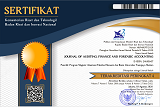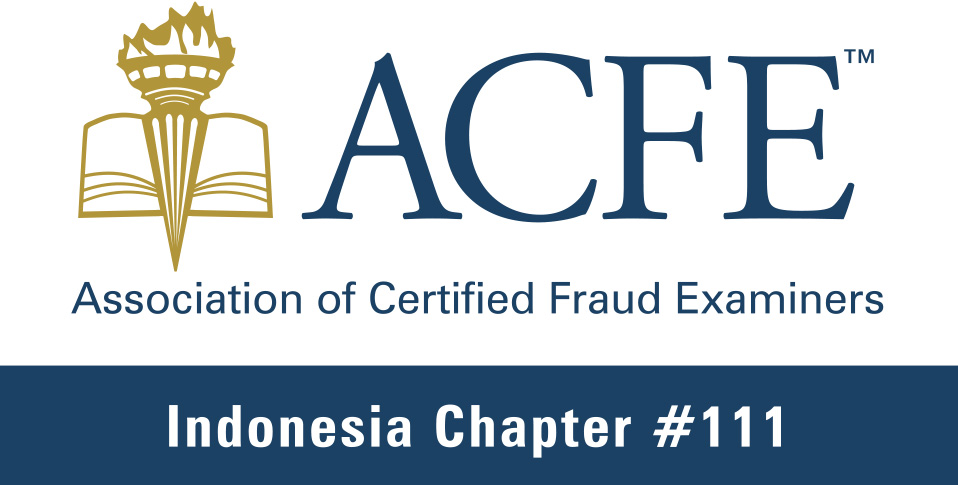Building Prophetic Accountability in State Financial Management for the People's Welfare
Abstract
Keywords
Full Text:
PDFReferences
Abdullah, S., & Halim, A. (2006). Hubungan dan Masalah Keagenan di Pemerintahan Daerah: (Sebuah Peluang Penelitian Anggaran dan Akuntansi). Jurnal Akuntansi Pemerintahan, 2(1), 53–64.
Agger, B. (2006). Teori Sosial Kritis, Kritik, Penerapan dan Implikasinya. Alih Bahasa: Nurhadi. Yogyakarta: Kreasi Wacana.
Ahimsa-Putra, H. S. (2017). Paradigma Profetik Islam: Epistemologi, Etos, dan Model. Yogyakarta: Gajah Mada University Press.
Amran, B. (2017). Menggugat Kembali Hasil Audit Badan Pemeriksa Keuangan. [Online] Available at: Http://Www.Birokratmenulis.Org/Menggugat-Kembali-Hasil-Audit-Badan-Pemeriksa-Keuangan/. [Accessed 23 Oktober 2017].
Azra, A. (2010). Islam, Corruption, Good Governance, and Civil Society: The Indonesian Experience. ICR Journal, 2(1), 109–125. https://doi.org/10.52282/icr.v2i1.683
Connolly, C., & Hyndman, N. (2006). The actual implementation of accruals accounting: Caveats from a case within the UK public sector. Accounting, Auditing and Accountability Journal, 19(2), 272–290. https://doi.org/10.1108/09513570610656123
Dawson, S., & Dargie, C. (2002). New Public Management A discussion with special reference to UK health. In: K. McLaughlin, S. P. Osborne & E. Ferlie, eds. New Public Management - Current trends and future prospects. London And New York: Routledge.
Der Hoek, V., Peter, M., & Peter Van Der Hoek, M. (2005). From Cash To Accrual Budgeting And Accounting In The Public Sector: The Dutch Experience. Public Budgeting & Finance, 25(1), 32–45.
Ellwood, S., & Newberry, S. (2007). Public sector accrual accounting: Institutionalising neo-liberal principles? Accounting, Auditing and Accountability Journal, 20(4), 549–573. https://doi.org/10.1108/09513570710762584
Eriyanto. (2001). Analisis Wacana, Pengantar Analisis Teks Media. Yogyakarta: PT LKIS Pelangi Aksara.
Kamayanti, A. (2011). Akuntansiasi atau Akuntansiana: Memaknai Akuntansi Sektor Publik di Indonesia. Jurnal Akuntansi Multi Paradigma, 3, 369–540.
Kamayanti, A. (2016). Metodologi Konstruktif Riset Akuntansi: Membumikan Religiositas. s.l.:Yayasan Rumah Peneleh.
Khaldun, I. (2016). Muqaddimah Ibn Khaldun. Jakarta: Pustaka Firdaus.
Kusdewanti, A. I., & Hatimah, H. (2016). Membangun Akuntabilitas Profetik. Jurnal Akuntansi Multiparadigma, 7(2), 156–323. https://doi.org/10.18202/jamal.2016.08.7018
Kusdewanti, A. i., Triyuwono, I., & Djamhuri, A. (2016). Teori Ketertundukan: Gugatan terhadap Agency Theory. s.l.:Yayasan Rumah Peneleh.
Mahmudi. (2006). Reformasi Keuangan Negara dan Daerah di Era Otonomi, Telaah Kritis Akuntansi Pemerintahan. s.1:BPFE-Yogyakarta.
McLaughlin, K., & Osborne, S. P. (2002). he New Public Management in Context. In: K. McLaughlin, S. P. Osborne & E. Ferlie, eds. New Public Management - Current trends and Future Prospects. In New Public Management: Current Trends and Future Prospects. London and New York: Routledge. https://doi.org/10.4324/9780203996362-4
Nasr, S. H. (1983). Islam Dan Nestapa Manusia Modern. Bandung: Penerbit Pustaka.
Pasoloran, O., Sukoharsono, E. G., Said, D., & Rura, Y. (2015). Narcissism in local budgeting: the mirror and mask effectsof public aspiration fund. The International Journal of Accounting and Business Society, 23(1), 73–96.
Prasetiadi, Y. S. (2016). Islam Rahmatan lilamin: Solusi Untuk Indonesia. Sukaharjo: Kaaffah Penerbit.
Pulungan, J. S. (1997). Fiqh Siyasah ; Ajaran, Sejarah, dan Pemikiran. Jakarta: LsiK.
Rizal, M. (2017). Mendobrak Mitos Audit BPK dan Opini WTP. [Online] Available at: Http://Katadata.Co.Id/Opini/2017/06/05/Mendobrak-Mitos-Audit-Bpk-Dan-Opini-Wtp. [Accessed 12 Oktober 2017].
Rommel, J., Christiaens, J., & Devos, C. (2005). Rhetorics of reform: the case of new public management as a paradigm shift. Gent.
Sanusi, H. M. A. (2009). Relasi Antara Korupsi dan Kekuasaan. Jurnal Konstitusi, 6(2), 83–104.
Sawarjuwono, T. (1997). Filosofi Bahasa Sebagai Ontologi dalam Riset Akuntansi. Media Akuntansi No.2, Th.IV.
Sukardi, I. (2010). Islam dan Civil Society. Jurnal Tsaqafah, 6(1), 114–127. https://doi.org/10.21111/tsaqafah.v6i1.141
Sukidin, & Basrowi. (2002). Metode Penelitian Kualitatif Perspektif Mikro. Surabaya: Insan Cendikia.
Umam, A. K. (2014). Islam, Korupsi, Dan Good Governance Di Negara-Negara Islam. Al-Ahkam, 24(2), 195–224.
DOI: https://doi.org/10.21107/jaffa.v10i1.13488
Refbacks
- There are currently no refbacks.
Our Journal indexed by:
Our support tools using:



This work is licensed under a Creative Commons Attribution 4.0 International License.












